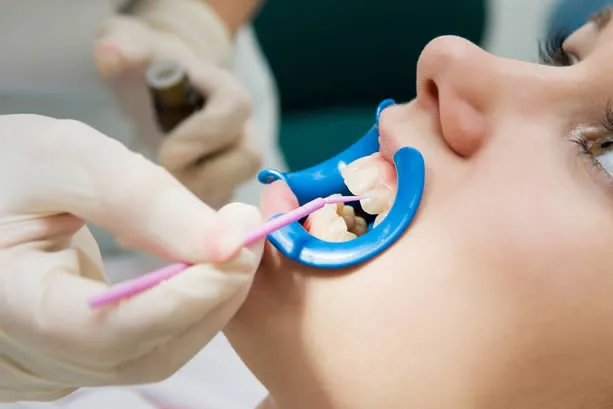What are dental sealants
Dental sealants are a preventive dental treatment designed to protect the chewing surfaces of your teeth from decay. They are a thin, plastic coating that is painted onto the grooves and pits of your teeth, forming a protective barrier against harmful bacteria and acids that can cause cavities. Sealants are most commonly used on the molars and premolars, which are the teeth at the back of the mouth that are used for chewing. By providing an extra layer of protection, dental sealants can help to reduce the risk of tooth decay and the need for more extensive dental treatment in the future. If you’re looking to maintain good oral health and prevent cavities, dental sealants may be a smart choice for you.
What to expect during a dental sealant application
Expect A Cleaning
First, your dentist will clean the teeth that will receive the sealants. This ensures that no debris or bacteria are present on the tooth surface, allowing the sealant to bond properly.
Expect Drying
Once the teeth are clean, your dentist will use an air compressor or other drying tool to ensure that the tooth surface is completely dry. Moisture can interfere with the bonding process, so this step is crucial.
Expect Etching
Next, your dentist will apply a mild acid solution to the tooth surface. This etches the surface of the tooth, creating a rough surface that helps the sealant bond to the tooth.
Expect Application
Once the tooth surface is prepared, your dentist will apply the sealant to the grooves and fissures of the tooth using a small brush. The sealant is a liquid resin that hardens quickly once applied.
Expect Curing
Finally, your dentist will use a special light to cure or harden the sealant. The light activates the resin, causing it to harden and form a protective barrier on the tooth surface.
More Questions about Dental Sealants?
The entire process of applying dental sealants typically takes only a few minutes per tooth and is painless. With proper care, dental sealants can last for several years, providing long-lasting protection against tooth decay. If you’re interested in dental sealants for yourself or your child, contact our office today to schedule a consultation. We look forward to seeing you.
What are the benefits of dental sealants?
Dental sealants are a highly effective preventative measure that offer several benefits to individuals of all ages:
- Dental sealants provide a protective barrier against tooth decay.
- Sealants are applied quickly and painlessly by a dentist or dental hygienist.
- They can reduce the risk of cavities in the permanent molars by up to 80%.
- Sealants can be especially beneficial for children and teenagers, as well as adults with a history of cavities.
- When applied and maintained properly, sealants can provide protection against decay for up to 10 years.
- Sealants are a cost-effective preventative measure, as they can save money on future dental treatment costs.
- They can help prevent the need for more invasive and expensive dental treatments such as fillings, crowns, and root canals.
- Sealants can be used in conjunction with other preventative measures, such as regular dental cleanings and checkups, to maintain good oral health.
- Dental sealants are a safe and non-invasive treatment option that can benefit individuals of all ages.
- They can improve overall oral health and prevent future dental problems.
Schedule an appointment at Jared Dastrup DDS and see what dental sealants can do for your dental health.
Who is the ideal candidate for dental sealants?
Dental sealants are a preventative measure that can help protect teeth from decay and other types of damage. While sealants can be beneficial for many individuals, there are certain groups who may be especially good candidates for this treatment:
- Children and teenagers: The American Dental Association recommends that children and teenagers receive dental sealants as soon as their permanent molars come in. This is typically around the ages of 6 and 12. By applying sealants early in life, children can benefit from long-lasting protection against tooth decay.
- Individuals with deep grooves or fissures on their molars: Teeth with deep grooves and fissures are more prone to decay, as food particles and bacteria can get trapped in these areas. Dental sealants can help seal off these grooves and fissures, preventing decay from developing.
- Individuals with a history of cavities: If you have a history of cavities, you may be at higher risk for future decay. Dental sealants can provide an extra layer of protection for your teeth, reducing the likelihood of future cavities.
- Individuals with orthodontic appliances: Braces and other orthodontic appliances can make it more difficult to properly clean teeth, increasing the risk of decay. Dental sealants can help protect teeth from decay during orthodontic treatment.
- Adults with healthy teeth: While dental sealants are often associated with children, adults with healthy teeth can also benefit from this preventative measure. Sealants can provide an extra layer of protection against decay, helping to maintain good oral health.
What are the statistics on dental sealants?
Dental sealants are a highly effective preventative measure that can significantly reduce the risk of tooth decay and other types of tooth damage. Here are some statistics that highlight the impact of dental sealants:
- Reduced risk of decay: According to the Centers for Disease Control and Prevention (CDC), dental sealants can reduce the risk of cavities in the permanent molars by up to 80%. In children aged 6-11 years old, sealants can reduce the risk of decay in these teeth by almost 40%.
- Cost-effective: The CDC estimates that for every dollar spent on dental sealants, between $8 and $38 can be saved in future dental treatment costs. This is because sealants can prevent the need for more invasive and expensive treatments such as fillings, crowns, and root canals.
- Long-lasting protection: When applied and maintained properly, dental sealants can provide protection against decay for up to 10 years. This means that a single application of sealants in childhood can help prevent decay and other types of tooth damage well into adulthood.
- Wide-reaching impact: Dental sealants are a simple and safe preventative measure that can benefit individuals of all ages. According to the American Dental Association, sealants can reduce the incidence of cavities by up to 80% in both children and adults.
ADDITIONAL FREQUENTLY ASKED QUESTIONS ABOUT DENTAL SEALANTS
What are dental sealants made of?
Dental sealants are made of a plastic-like material called resin.
How long do dental sealants last?
When applied and maintained properly, dental sealants can last up to 10 years.
Do dental sealants hurt?
No, dental sealants are painless and do not require any numbing or anesthesia.
Can dental sealants be used on any teeth?
Dental sealants are typically used on the molars, which are more prone to decay due to their deep grooves and fissures.
Is there a dentist near me in Colorado Springs that offers dental sealants?
Yes. At our Colorado Springs dental office we offer dental sealants to patients from Colorado Springs and the surrounding area. Contact our office today to schedule an appointment.


